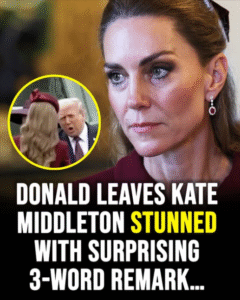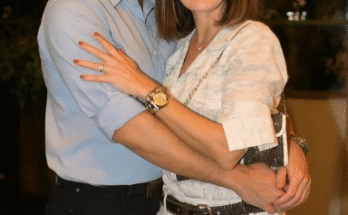“You’re So Beautiful, So”: Diplomacy, Decorum, and the Three Words That Stunned Kate Middleton
In the theater of global diplomacy, where every gesture is choreographed and every word scrutinized, it’s often the unscripted moments that linger. During President Donald Trump’s 2025 state visit to the United Kingdom, one such moment unfolded on the east lawn of Windsor Castle. As Marine One’s rotor wash settled and the ceremonial pageantry began, Trump stepped forward, greeted the Prince and Princess of Wales, and uttered a three-word remark to Kate Middleton that would ripple across headlines and social media: “You’re so beautiful, so”.
It was a compliment—simple, spontaneous, and striking. But in the context of royal protocol and international optics, it was also a moment of disruption. Kate Middleton, known for her poise and polished diplomacy, appeared momentarily stunned. Not offended, not flattered—just caught off guard. And in that pause, the world watched.
The remark, interpreted by lip-reading specialist Jeremy Freeman from footage of the encounter, quickly became the focal point of the day’s coverage. While the state visit included military salutes, carriage parades, and formal receptions with King Charles and Queen Camilla, it was Trump’s off-the-cuff compliment that dominated the narrative. Why? Because it revealed something deeper about the nature of public figures, the tension between authenticity and decorum, and the way charisma can both charm and challenge.
Kate Middleton, dressed in a deep cranberry coat dress with a veiled Jane Taylor hat and vintage Chanel bag, embodied the elegance expected of a royal hostess. Her outfit was deliberate—autumnal yet celebratory, traditional yet modern. It was diplomacy through fashion, a silent language of respect and refinement. Trump’s remark, by contrast, was loud in its informality. It bypassed protocol and went straight to personal admiration.
For some, the compliment was harmless—a moment of genuine appreciation. For others, it was inappropriate, a breach of royal etiquette. But beyond the debate, the incident invites a broader reflection: What happens when the personal collides with the ceremonial? When spontaneity enters a space designed for restraint?
Trump has long been known for his unfiltered style, a trait that both endears and alienates. In this case, his remark to Kate Middleton was not lewd or disrespectful, but it was unexpected. It disrupted the rhythm of the greeting, injecting a moment of vulnerability into an otherwise scripted exchange. And in doing so, it reminded us that diplomacy is not just about policy—it’s about people.
Kate’s reaction—graceful, composed, but visibly surprised—was a masterclass in poise. She didn’t recoil or rebuke. She smiled, nodded, and moved forward. But the flicker of surprise in her eyes spoke volumes. It was the kind of moment that reveals the human beneath the title, the woman beneath the crown.
This encounter also underscores the power of words—especially when they’re few. “You’re so beautiful, so” is not a complex sentence. It’s not eloquent or profound. But it’s intimate. It’s direct. And in the context of a state visit, it carries weight. It shifts the focus from diplomacy to personality, from nationhood to individual presence.
In many ways, this moment mirrors the broader tension in modern public life: the push and pull between authenticity and decorum. Public figures are expected to be polished, predictable, and politically correct. But audiences crave realness, spontaneity, and connection. Trump’s remark, whether intentional or impulsive, tapped into that craving. It was a reminder that even in the most formal settings, humanity finds a way to surface.
The media response was swift and varied. Some outlets praised the compliment as charming and sincere. Others criticized it as inappropriate and tone-deaf. Social media, predictably, exploded with memes, debates, and hot takes. But beneath the noise, the incident sparked a quieter conversation: What does it mean to be seen?
Kate Middleton, like many women in the public eye, is often admired for her beauty. But she is also a mother, a philanthropist, and a future queen. Compliments that focus solely on appearance can feel reductive, even when well-intentioned. Trump’s remark, while complimentary, risked flattening her identity into a single dimension. And yet, it also acknowledged her presence in a way that was personal, not political.
This duality—between recognition and reduction—is something many public figures navigate daily. Compliments, especially from powerful men to prominent women, carry layers of meaning. They can affirm, but they can also overshadow. They can connect, but they can also distract.
And yet, the moment between Trump and Kate was not hostile. It was not scandalous. It was simply human. A man saw a woman and spoke his mind. A woman heard the words and responded with grace. The world watched, interpreted, and reacted.
In the days that followed, the state visit continued with banquets, speeches, and diplomatic meetings. But the three-word remark remained a touchstone—a reminder that even in the grand theater of international relations, it’s the small moments that resonate.
So what do we take from this?
Perhaps it’s a lesson in presence. In watching closely. In understanding that behind every title, every role, every public persona, there is a person. And sometimes, that person is caught off guard. Sometimes, they are complimented. Sometimes, they are stunned.
Kate Middleton’s response was a study in grace under surprise. Donald Trump’s remark was a study in spontaneity. Together, they created a moment that was unscripted, unforgettable, and deeply human.
In the end, diplomacy is not just about treaties and trade. It’s about connection. And sometimes, that connection comes in three words.



